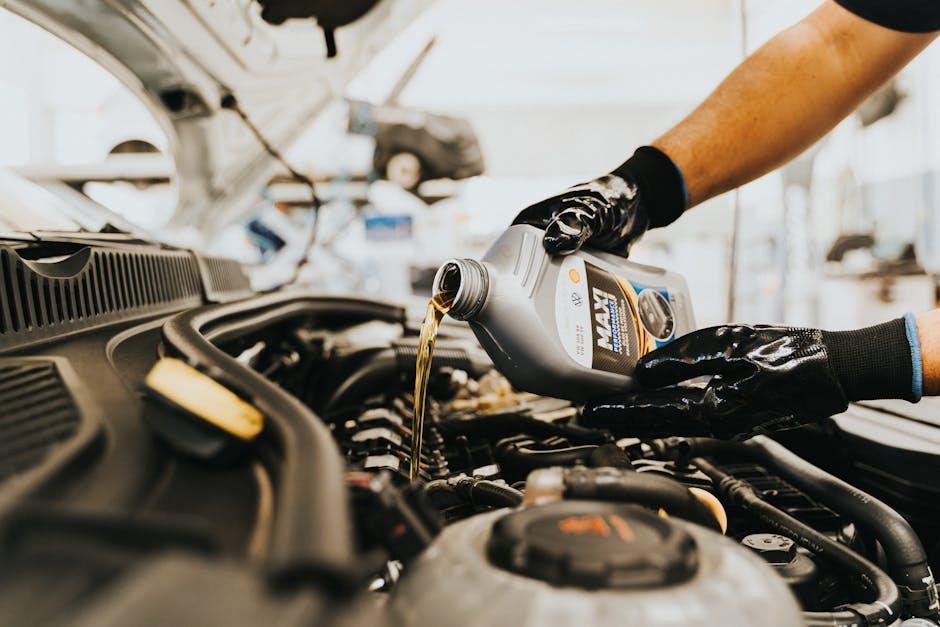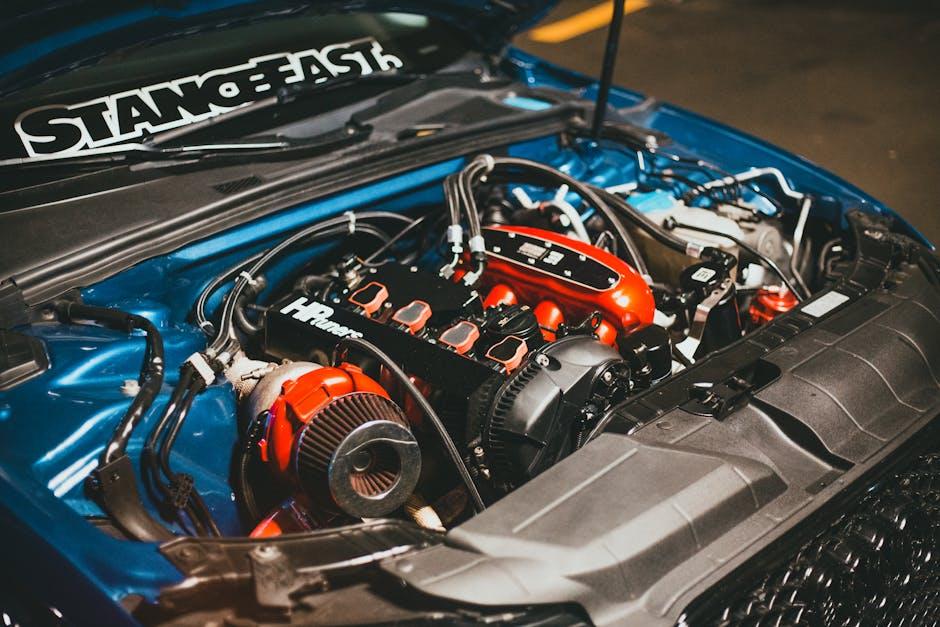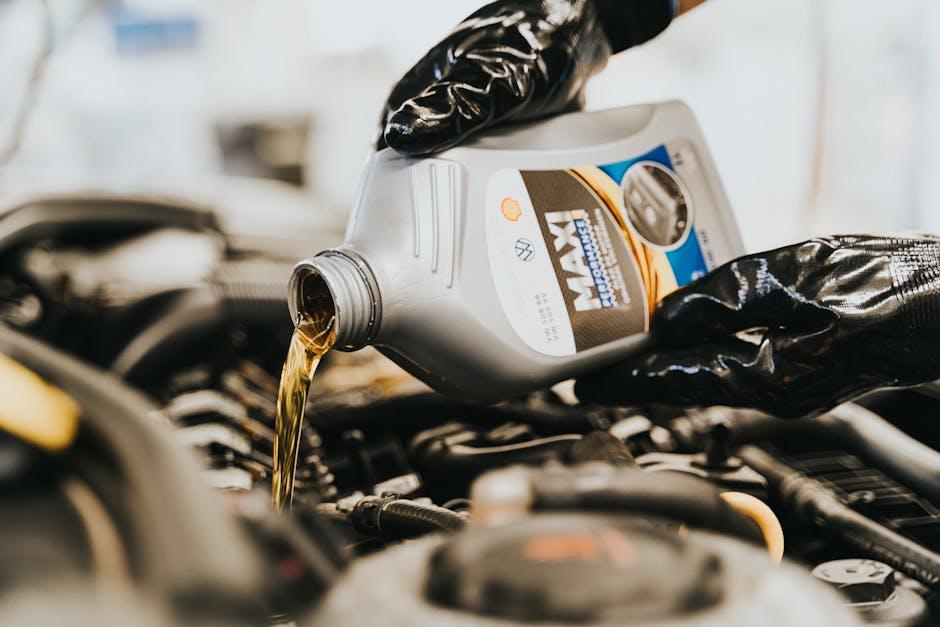Every car owner knows that regular oil changes are the lifeblood of a healthy engine, yet many still stumble over common pitfalls that can undermine their vehicle’s performance and longevity. Whether you’re a seasoned DIY mechanic or simply rely on your trusted service shop, avoiding certain oil change mistakes is crucial to keeping your engine running smoothly and efficiently. In this article, we’ll explore the most frequent errors people make during oil changes—and how to sidestep them—so your next oil change can be as effective and hassle-free as possible.
Table of Contents
- Common Pitfalls in Selecting the Wrong Oil Type
- The Consequences of Skipping Regular Oil Changes
- Why Overlooking the Oil Filter Can Harm Your Engine
- The Importance of Checking Oil Levels Between Changes
- How Using Cheap Oil Can Affect Vehicle Performance
- Best Practices for Proper Disposal of Used Oil
- Q&A
- Wrapping Up

Common Pitfalls in Selecting the Wrong Oil Type
Choosing the incorrect oil type can lead to a cascade of mechanical issues that are often costly to repair. Many drivers overlook the crucial distinctions between synthetic, conventional, and high-mileage oils, inadvertently subjecting their engines to improper lubrication. This misstep can cause accelerated wear on engine components, reduced fuel efficiency, and even overheating. It’s essential to consult your vehicle’s manual or a trusted mechanic before making a selection, ensuring the oil’s viscosity and performance ratings align perfectly with your car’s specifications.
Be aware of common misunderstandings that often influence oil choice:
- Assuming thicker oil always protects better: While a higher viscosity may seem stronger, it can actually strain the engine if it’s not what the manufacturer recommends.
- Ignoring environmental and driving conditions: Cold weather demands different oil characteristics than hot climates; urban stop-and-go traffic differs from highway cruising.
- Overlooking oil certifications and approvals: Not all oils meet the same industry standards, which can impact your warranty and engine health.
| Oil Type | Ideal Use | Common Mistake |
|---|---|---|
| Synthetic | High-performance, extreme temperatures | Using in older engines with seals sensitive to additives |
| Conventional | Standard driving conditions, budget-friendly | Using in high-mileage or high-stress engines |
| High-Mileage | Vehicles over 75,000 miles | Unnecessarily using in newer engines |

The Consequences of Skipping Regular Oil Changes
Neglecting to change your engine oil at regular intervals can initiate a domino effect of mechanical issues. Over time, oil breaks down and loses its ability to lubricate effectively, causing internal engine parts to grind against each other. This friction leads to increased wear and tear, overheating, and potentially catastrophic engine failure. Beyond the mechanical consequences, skipping oil changes also reduces fuel efficiency and increases harmful emissions, subtly draining your wallet at every refuel.
Here’s what can happen when fresh oil is sidelined:
- Sludge buildup: Old oil thickens and forms deposits that clog oil passages.
- Reduced engine performance: The engine struggles to operate smoothly, impacting acceleration and power.
- Costly repairs: Ignoring oil maintenance can escalate to expensive fixes like oil pump replacements or engine rebuilds.
| Symptom | Cause | Potential Damage |
|---|---|---|
| Engine knocking | Insufficient lubrication | Worn bearings |
| Overheating | Oil breakdown | Gasket damage |
| Smoke from exhaust | Oil contamination | Incomplete combustion |

Why Overlooking the Oil Filter Can Harm Your Engine
It’s easy to focus solely on the oil itself during a change, but the oil filter plays a crucial role in maintaining your engine’s health. This small component traps dirt, metal particles, and sludge that accumulate from engine wear and tear. When neglected, a clogged or damaged filter restricts oil flow, causing unfiltered oil to circulate, which accelerates engine wear. Over time, this can lead to decreased performance, overheating, and potentially costly repairs.
To highlight its importance, consider the impact of ignoring the oil filter as shown in the table below:
| Symptom | Cause | Result |
|---|---|---|
| Engine Overheating | Restricted oil circulation | Increased friction and wear |
| Reduced Fuel Efficiency | Poor lubrication | Engine works harder |
| Excessive Engine Noise | Metal particles not filtered | Damage to moving parts |
Regularly replacing the oil filter is an easy yet vital step in protecting your engine’s longevity. Neglecting it not only wastes fresh oil but exposes critical engine components to harmful contaminants. Don’t let such a simple oversight result in costly engine failures down the road.
- Choose the right filter for your vehicle
- Replace the filter during every oil change
- Inspect for leaks and damage to the filter housing

The Importance of Checking Oil Levels Between Changes
Regularly monitoring your engine oil level is a crucial habit that many drivers overlook. Waiting until the scheduled oil change might seem sufficient, but fluctuating oil levels can indicate leaks or consumption issues that need immediate attention. By checking oil more frequently, you can catch these problems early, preventing engine damage and costly repairs down the line. It’s a simple step that can dramatically extend the life of your engine and maintain optimal vehicle performance.
When checking your oil, ensure your vehicle is on level ground and the engine is cool or has been off for a few minutes. Use the dipstick to assess not just the level but also the color and consistency. Look out for:
- Oil level below the minimum mark — signaling a need for a top-up or possible leaks
- Dark, gritty oil — indicating the oil is dirty and may not lubricate effectively
- Milky or foamy oil — a sign of coolant contamination
| Check Aspect | What to Look For | Action Required |
|---|---|---|
| Oil Level | Below minimum | Top up immediately, inspect for leaks |
| Oil Color | Dark and gritty | Schedule oil change |
| Oil Consistency | Milky or foamy | Check for engine coolant leaks |

How Using Cheap Oil Can Affect Vehicle Performance
Opting for low-quality oil might seem like a cost-saving move, but its impact on your vehicle’s performance can be surprisingly detrimental. Cheap oil often lacks the necessary additives and proper viscosity needed to withstand high engine temperatures and friction. This can lead to increased engine wear, reduced fuel efficiency, and even sluggish acceleration. Without the proper lubrication, engine components are more prone to metal-on-metal contact, accelerating wear and potential damage over time.
Moreover, cheap oil can cause sludge buildup, clogging vital engine parts and restricting oil flow. This buildup reduces the engine’s ability to cool and lubricate effectively, which compromises overall performance. To illustrate, consider the following comparison:
| Oil Quality | Engine Protection | Fuel Efficiency | Price |
|---|---|---|---|
| Cheap Oil | Poor | Low | $ |
| Premium Oil | Excellent | High | $$$ |
- Increased wear and tear can shorten the lifespan of your engine.
- Engine sludge buildup causes blockages and overheating.
- Poor fuel economy leads to higher long-term costs.

Best Practices for Proper Disposal of Used Oil
Properly disposing of used oil is essential for environmental protection and legal compliance. Instead of pouring it down drains, onto the ground, or into trash bins, always collect your used oil in a clean, leak-proof container. Many auto shops and recycling centers accept used oil—never underestimate the value of these drop-off points. You can also check for local hazardous waste collection events where used oil is safely processed. Storing oil in sealed containers not only prevents spills but also safeguards wildlife and soil health from contamination.
Follow these tips to ensure responsible disposal and avoid costly mistakes:
- Use proper sealable containers—avoid mixing oil with other fluids to facilitate recycling.
- Keep a designated area away from water sources for used oil storage before disposal.
- Utilize authorized facilities to guarantee the oil is either recycled or disposed of according to regulations.
- Never mix used oil with solvents or antifreeze, which can complicate processing and create hazardous waste.
| Facility Type | Accepted Items | Additional Notes |
|---|---|---|
| Auto Repair Shops | Used motor oil | Often free of charge |
| Recycling Centers | Oil, filters | Prolongs life cycle of oil |
| Hazardous Waste Sites | Mixed automotive fluids | Strict handling protocols |
Q&A
Q&A: Oil Change Mistakes to Avoid
Q1: Why is performing regular oil changes important for my vehicle?
A1: Regular oil changes keep your engine lubricated, reduce friction, and remove contaminants. This helps maintain engine performance, improves fuel efficiency, and extends your vehicle’s lifespan.
Q2: What are common mistakes people make when changing their oil?
A2: Some frequent errors include using the wrong type or grade of oil, overfilling or underfilling the oil, failing to replace the oil filter, and neglecting to properly dispose of used oil.
Q3: How can using the wrong oil type harm my engine?
A3: Using oil that doesn’t meet your vehicle’s specifications can reduce engine protection, cause increased wear, or impact fuel economy. It may also affect the oil’s ability to flow properly under certain temperatures.
Q4: What happens if I overfill or underfill my oil?
A4: Overfilling can cause increased pressure inside the engine, leading to leaks or damage, while underfilling leaves insufficient lubrication, resulting in overheating and accelerated wear.
Q5: Is it really necessary to change the oil filter every time?
A5: Yes. The oil filter traps dirt and debris. Reusing an old, clogged filter can contaminate fresh oil, diminishing its effectiveness and potentially harming the engine.
Q6: Can I extend oil change intervals to save money?
A6: While modern oils and engines offer longer intervals, it’s best to follow your manufacturer’s recommendations. Extending intervals excessively risks sludge buildup and engine damage.
Q7: What’s the best way to ensure my oil change is done correctly?
A7: Whether DIY or professional, double-check that the correct oil type and amount are used, the oil filter is replaced, and no leaks are present. Keep records of oil changes to monitor maintenance.
Q8: How should I handle the disposal of used oil?
A8: Never pour used oil down drains or on the ground. Collect it in a sealed container and take it to a recycling center or auto shop that accepts used oil for environmentally safe disposal.
Q9: Can skipping oil changes affect my vehicle’s warranty?
A9: Yes. Failure to perform oil changes as specified can void warranties, as proper maintenance is typically a condition of coverage.
Q10: Any final tips for oil change success?
A10: Stay vigilant. Use the right products, follow schedules, and don’t rush the process. A well-maintained oil system translates to a healthier, longer-lasting engine.
Wrapping Up
In the ever-evolving journey of vehicle maintenance, mastering the art of an oil change is a simple yet essential pit stop. By steering clear of these common mistakes, you not only extend the life of your engine but also ensure a smoother ride ahead. Remember, the road to optimal performance is paved with mindful care—so next time you’re under the hood, let knowledge be the oil that keeps your engine running clean and strong. Safe travels!

